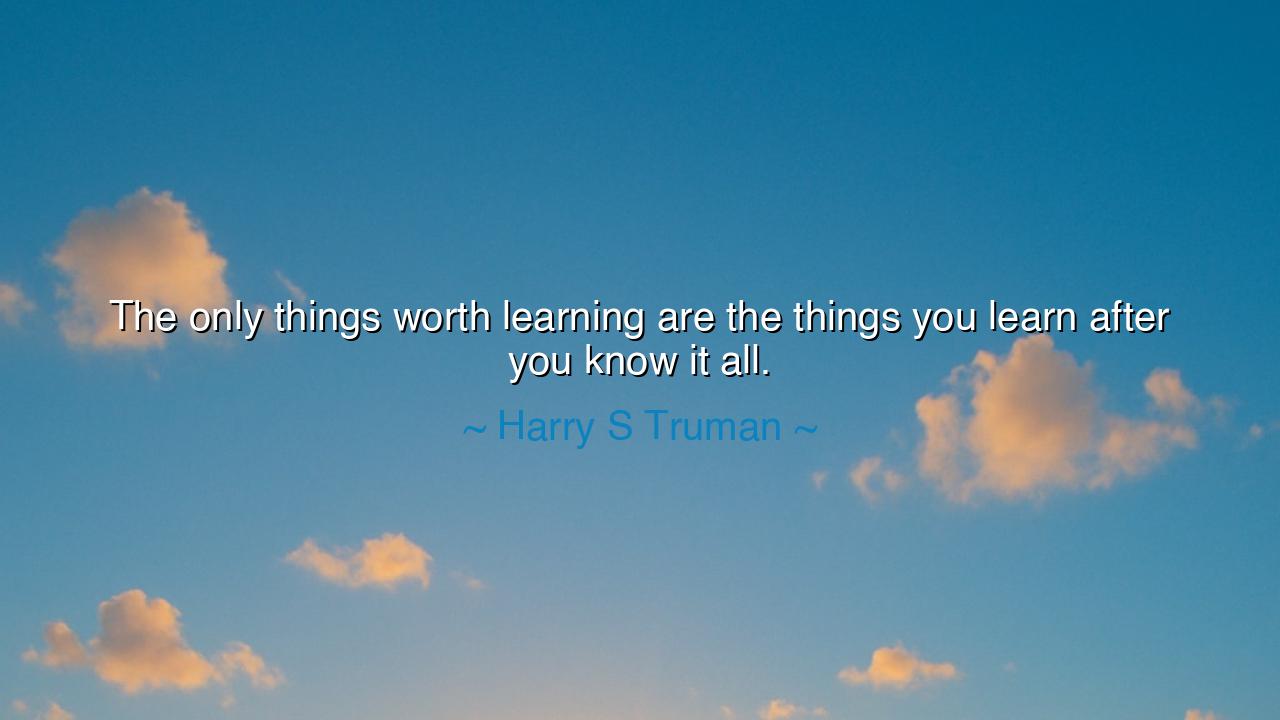
The only things worth learning are the things you learn after you






“The only things worth learning are the things you learn after you know it all.” – Harry S. Truman
In this sharp and timeless saying, Harry S. Truman, the humble farmer who rose to the highest office of his nation, reveals one of the deepest truths of human growth — that wisdom begins where arrogance ends. He speaks of that moment in life when a person, swollen with pride in their knowledge, is suddenly struck by experience, humbled by reality, and forced to see how little they truly understand. It is in that moment — the collapse of certainty, the shattering of illusion — that the doors of true learning finally open. For as long as a man believes he knows it all, his mind is a closed room; only when life cracks the walls of his confidence does the fresh air of understanding begin to flow in.
The origin of this wisdom lies in Truman’s own life, which was marked not by privilege, but by persistence and humility. He had no college degree, no formal background in governance when he became President of the United States in the aftermath of World War II — yet he led with clarity and courage. He learned from every failure, every hard lesson of history, and every mistake he made. He knew that real education comes not from books or titles, but from experience, from the harsh tutoring of life itself. His words reflect the insight of one who had faced both power and limitation, and who understood that the greatest lessons often come only after one believes there is nothing left to learn.
This quote strikes at the heart of the human condition. In youth, we burn with certainty. We think we have grasped the essence of the world, that our opinions are truth and our understanding complete. Yet life — patient, merciless, and wise — has a way of correcting that illusion. It humbles the proud, tests the confident, and refines the soul through difficulty. The lessons worth learning are those carved into us by challenge: the empathy that comes only after failure, the patience that comes only after disappointment, the courage that comes only after fear. It is only when we are stripped of our supposed wisdom that we begin to see clearly.
The ancients knew this well. The oracle of Delphi declared that Socrates was the wisest of all men — not because he knew much, but because he knew he knew nothing. This humble awareness made him open to truth, while others remained blind in their certainty. So too does Truman’s quote echo that same eternal paradox: the more we think we know, the less we are able to learn. The beginning of wisdom is not accumulation, but surrender — the willingness to admit ignorance and be taught anew. The student who knows he is ignorant learns quickly; the scholar who believes he has mastered the world learns nothing.
There is a tale of Sir Isaac Newton, who, near the end of his life, was asked to reflect on his achievements. Having unlocked the laws of motion and gravity, having gazed deeper into creation than any man before him, Newton said humbly: “I do not know what I may appear to the world, but to myself I seem to have been only like a boy playing on the seashore… while the great ocean of truth lay all undiscovered before me.” In that moment, Newton, like Truman, revealed the essence of wisdom — that the greatest minds are those who never stop learning, even after they “know it all.” The truly wise remain students forever.
Truman’s words also carry a lesson in character and humility. To live as a lifelong learner is to reject complacency. It means allowing oneself to be corrected, to listen more than speak, to question even one’s own convictions. It requires the courage to look foolish in pursuit of understanding and the strength to accept when one has been wrong. These qualities are the hallmarks of the mature mind, the mind that continues to grow even in old age, while others stagnate in the comfort of their assumptions. The man who believes he knows it all builds his own prison; the man who keeps learning builds his freedom.
So let this teaching be carved upon your heart: beware the moment you think you know everything, for that is the moment your learning stops. Life will always have more to teach — through joy, through pain, through loss, through renewal. Embrace every experience, even the humbling ones, as a teacher. Listen more deeply. Ask questions even when you think you know the answers. Let curiosity be your companion, and humility your guide. For as Truman reminds us, the only wisdom that endures is that which is gained after pride has fallen away — the kind learned not from triumph, but from truth.
And remember: the wise man’s mind is never full, for he keeps space within it for mystery, for growth, for revelation. The fool believes himself complete; the sage remains a student of life until his final breath. To learn after you know it all is to be reborn — and that, dear listener, is the path to true civilization of the soul.






AAdministratorAdministrator
Welcome, honored guests. Please leave a comment, we will respond soon